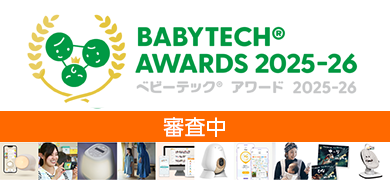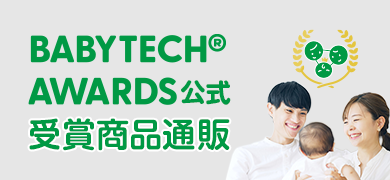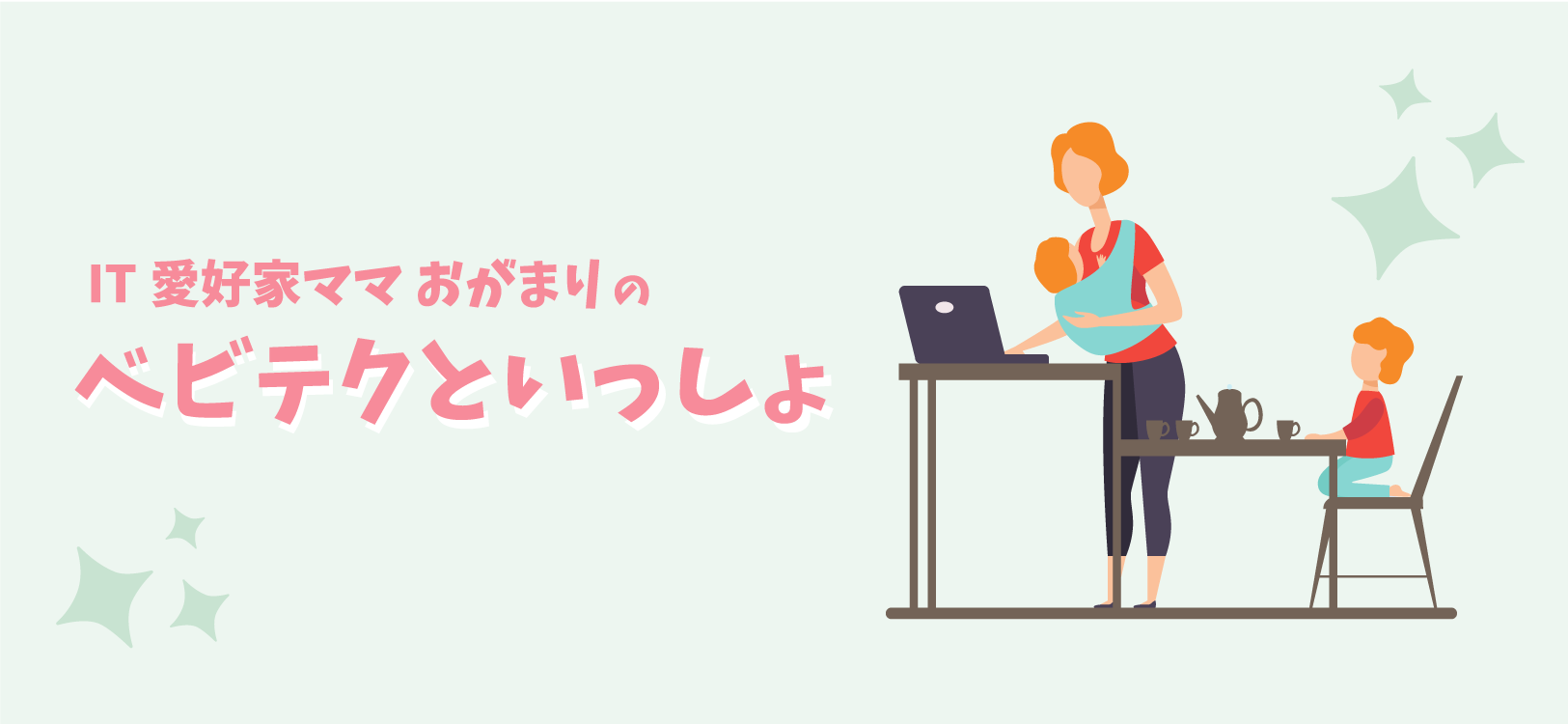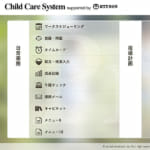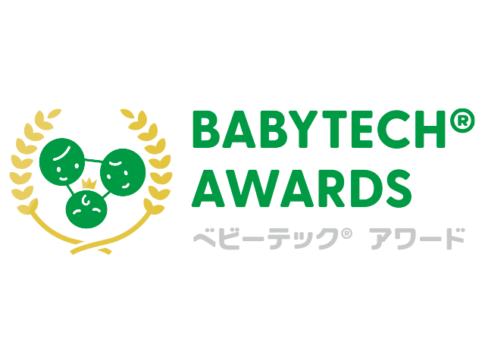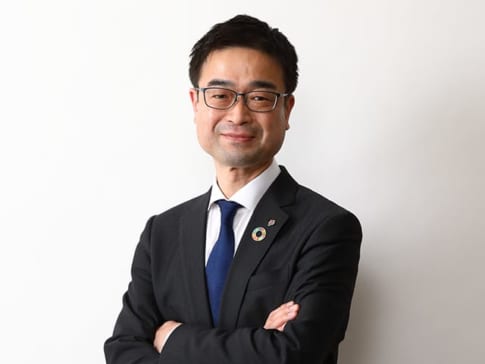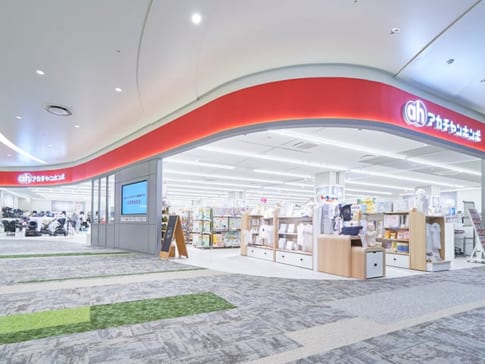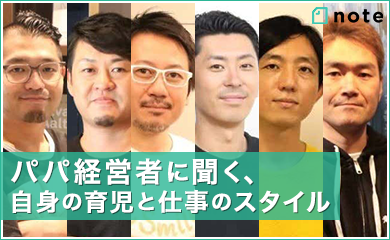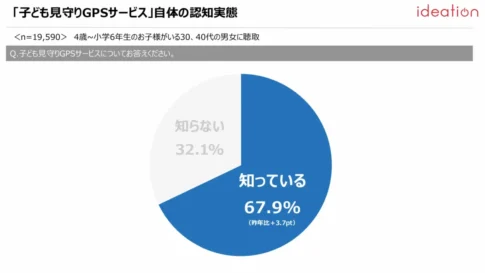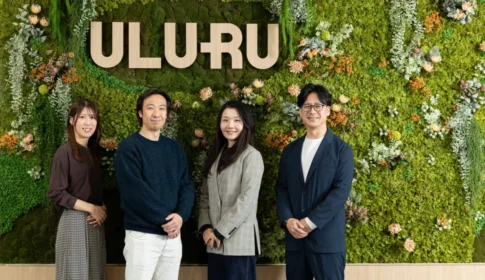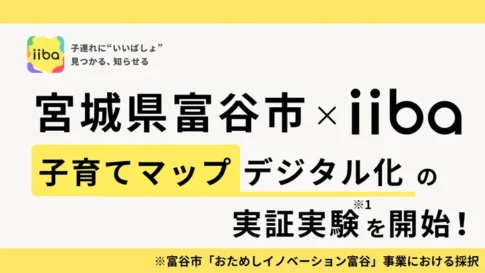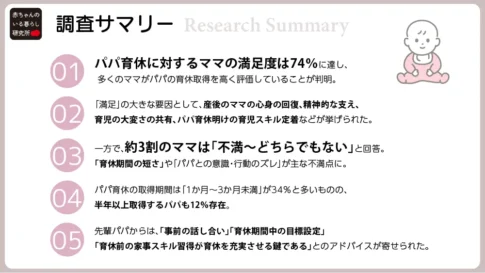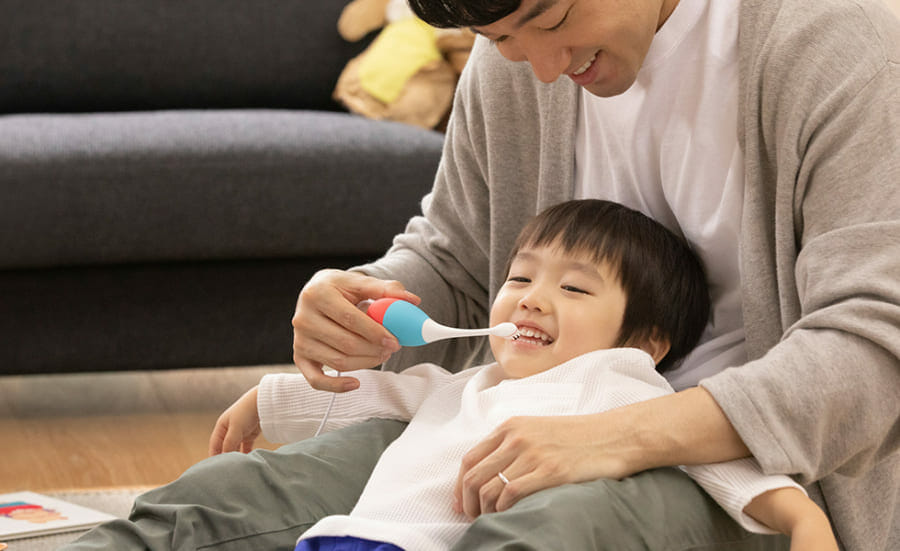
- The concept is "to turn children's reluctance to brush their teeth into a fun time.
- Kyocera, Lion, and Sony each realized their respective ideas through a process of trial and error.
- Raised support through crowdfunding, reaching a goal of 20 million yen.
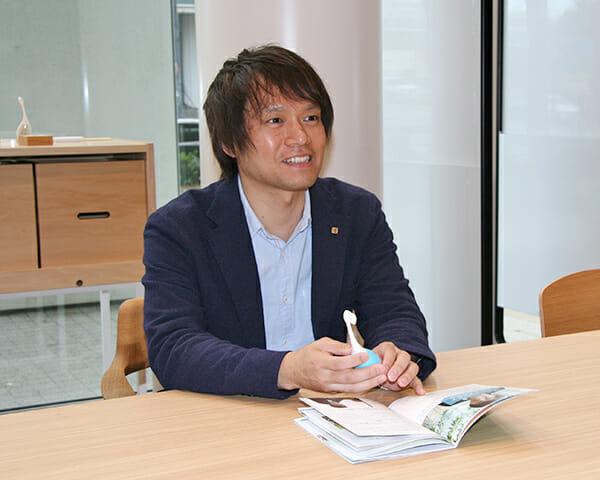
(We spoke to...)
Kyocera Corporation Business Development Section 3, Tokyo Business Development Department, Medical Development Center, Research and Development Division
Tomohiro Inagaki
As a father and an engineer
Applying Kyocera's technological expertise to make tooth brushing a fun time for parents and children
Editorial:What are some of the features of Posi?
Inagaki:Simply put, Posh is a toothbrush that only plays music when you brush your teeth. Even children who do not want to brush their teeth will quietly open their mouths, making it easier for mothers and fathers to brush their teeth. As far as I know, there was no other product like this in the world at the time of development.
Editorial:Can you tell us how the music is heard only when you brush your teeth?
Inagaki:When the brush hits the teeth, a piezoelectric ceramic element built into the head of the toothbrush works to transmit vibration (sound) to the teeth. The piezoelectric ceramic element is also used in Kyocera's cell phones and smartphones.
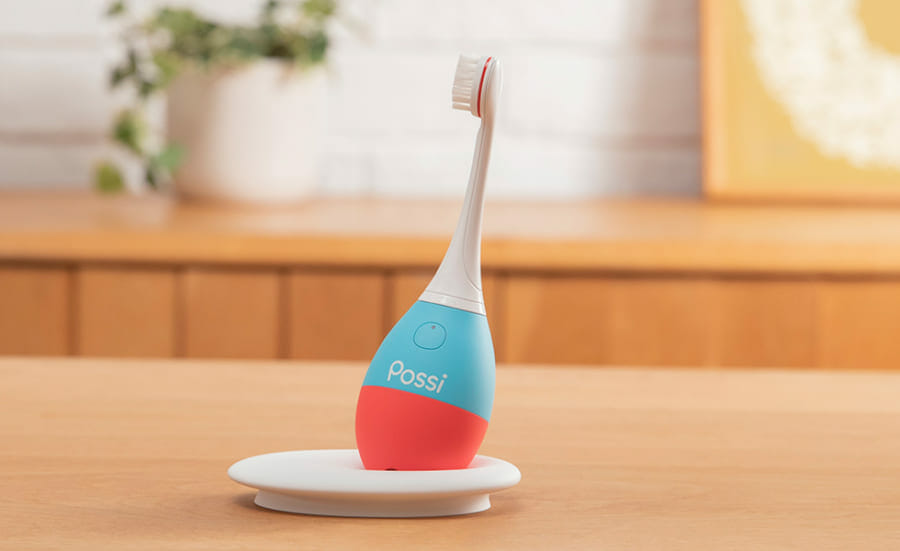
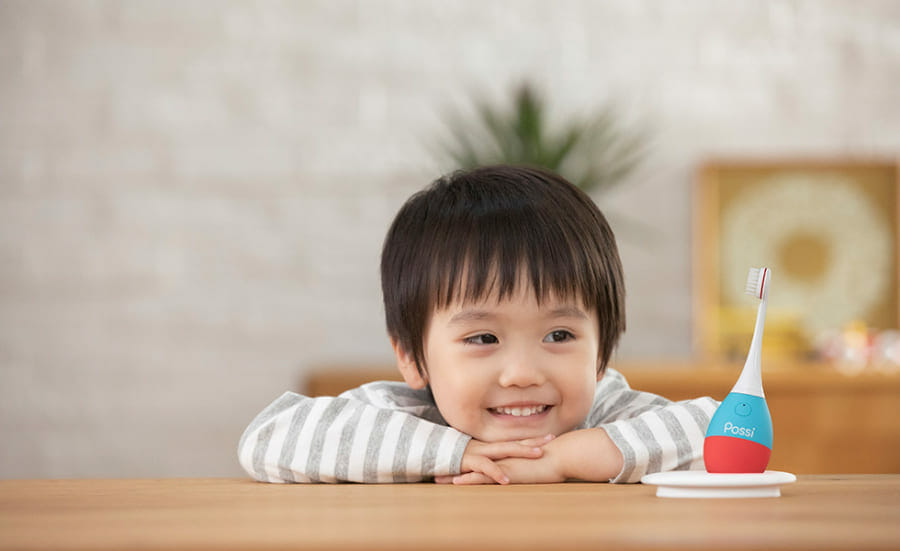
Editorial:It is a very lovely design. Did you have any motif for it? Can you tell us about the origin of the name "Posi"?
Inagaki:The design is based on the shape of an animal's tail, which makes the toothbrush look like a character. We also focused on pop and colorful shades to make it familiar to children. The product name "Possible" was taken from the word "tail," and the name "Possible" was chosen. The name "Possible" is also a play on the word "possibleness," which means the potential of children.
Editorial:What was the impetus for development in the first place?
Inagaki:In the process of exploring other uses for piezoelectric ceramic elements, I developed a "vibration actuator" with digitalization and high output. While considering whether we could offer this to other companies as a component for bone-conduction earphones, I was also looking for an interesting way to cut a deal. One day, I was using an electric toothbrush at home and suddenly realized that it was not very comfortable to use. The body was heavy and the vibrations made my hands numb. So I came up with the idea of having a piezoelectric element built into the head part to make it vibrate, which would reduce the vibration of the body part. Right around that time, I was asked to join SSAP, and I thought I would try to compete with the idea that led to this posi. As a father of three children myself, I have had to deal with a lot of polishing, so I was eager to apply my skills as a father and an engineer to daily childcare.
Editorial:Although Posi is not an electric toothbrush, the idea originally came from dissatisfaction with electric toothbrushes, didn't it? What is the "SSAP" activity that you mentioned earlier?
Inagaki:SSAP stands for "Sony Startup Acceleration Program," a program of Sony Corporation ("Sony") that supports the creation and business operations of startups. Kyocera is mainly in the components business, so it has not been able to bring many products to the market for general users like Sony has. This was a great opportunity for us to learn from Sony's expertise, while being provided with the know-how that Sony has cultivated so far.
Editorial:Will the posi be a Kyocera branded product?
Inagaki:Yes. Kyocera is responsible for the manufacturing, sales, and ultimate responsibility for Posi. It is Kyocera that actually manufactures the product for commercialization, and Sony is only in a position to provide support. This product is called a collaboration between Kyocera and Lion Corporation ("Lion"), and Kyocera is positioned as the manufacturer and marketer. Incidentally, various other companies besides ours have participated in SSAP, and we were able to receive a positive evaluation from Sony, who said, "Posi is one of the best examples. I believe that even for Sony, which has a history of creating innovative products, Posi's proposal of a new lifestyle scene with music was accepted as groundbreaking.
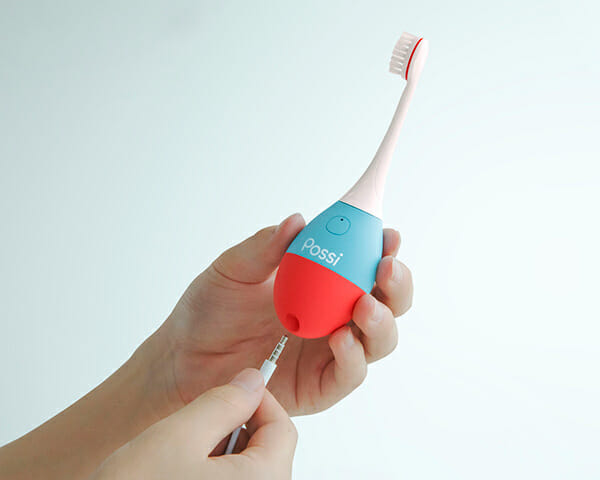
Editorial:You mentioned that the product is a collaboration with Lion, which of you lobbied for it first?
Inagaki:Our company approached Lion; SSAP began in October 2018, but Lion's participation began in January 2019, after the new year. It all started with an exhibition in the fall of 2018. Lion happened to be interested in the vibration actuator we were exhibiting as a reference exhibit, and approached us to see if we could do something with this technology. As I had just started development of the Posi, I was convinced that it was fate. I told Lion of my enthusiasm for Posi.
The development of toothpaste that has never been done before is
It was a series of trials and tribulations with no room for error.
Editorial:How did the lions react?
Inagaki:Many people thought it would be difficult because of the unprecedented product and tight schedule, but thankfully, there was a person within Lion who was interested in the product, and thanks to his enthusiasm, we were able to move quickly to commercialize it.
Editorial:You started the process of commercialization, but didn't you have a lot of difficulties when it came to creating a toothbrush that had never existed before?
Inagaki:Since we were completely new to toothbrushes, we had zero expertise in manufacturing methods and other aspects of toothbrushes. We started by discussing how to make one within the company and managed to create a prototype, but it was far from the quality that Lion demanded of a toothbrush.
Editorial:And we have pride as a brand built on oral care.
Inagaki:Yes, we do. Even though the shape of the toothbrush was different from the previous ones, the name "Lion" meant that no compromises were allowed, so it was only natural that we had to be strict about quality. We combined the knowledge and technologies of both companies to create this product at a rapid pace in a short period of time with no room for error.
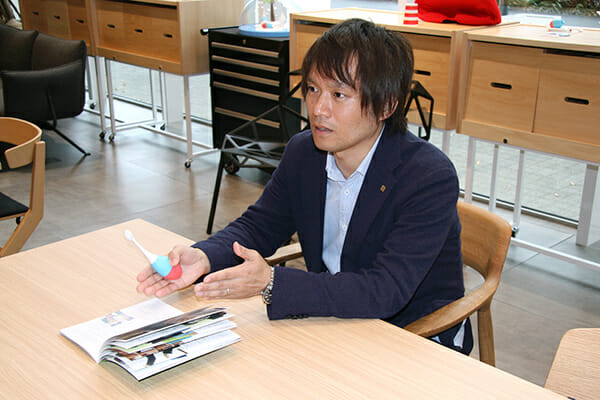
Editorial:Why was the schedule so tight?
Inagaki:The SSAP was required to produce certain results in a six-month period. No matter how good the idea was, it had to produce results at the end of the six months; if it was in reasonable shape by March 2019 and had no prospects for the future, the program would be terminated. Three months had already passed when we proposed the idea to Lion, so we worked hard to make sure we had three months left to try to make it work. Fortunately, prospects were good and we managed to clear the first hurdle.
Editorial:So the road to the birth of Posi was also a race against time.
Inagaki:Yes, we are. Sony evaluated Posi as a business opportunity that would be worthy of crowdfunding (CF) support. And they immediately approached me to present Posi at a major Sony event in July 2019. Moreover, we had to ensure the prospect of mass production before the presentation. It was extremely difficult to overcome this hurdle in three months, because creating a prototype and mass-producing a product are two completely different things, even if they are the same thing. This was the second hurdle.
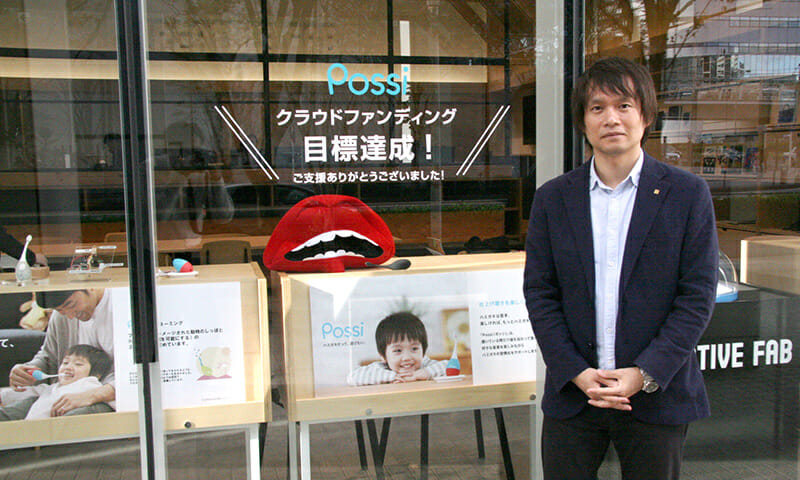
Editorial:After overcoming numerous challenges, the CF successfully achieved its goal of 20 million yen in two months.
Inagaki:The amount of 20 million yen was set as the minimum sales target to be secured by Kyocera and Lion in order to commercialize the product. The set of the Posi toothbrush, including the main unit and three replacement brushes, was priced at 17,500 yen (excluding tax), which was an unbelievable price. The members involved in the development of this product, including myself, were absolutely confident, but there were some who were concerned about whether it would really sell. As a result, we believe we were able to visualize the needs of about 1,300 people who purchased the product.
Editorial:Have you held any hands-on events?
Inagaki:Of course we did. Although the parents were sympathetic to the concept of "turning children's reluctance to brush their teeth into a fun time," it was often difficult to get them to believe that their children would really brush their teeth docilely. Still, we were very happy when parents who were skeptical put the toothpaste in their children's mouths and realized for the first time how good it was. The hands-on event was very meaningful, and I think it also gave me a great deal of confidence that my child, who used to have a hard time brushing his teeth, was able to open his mouth quietly after he started using the Posi.
Wanting to participate in child care but not being able to.
Dads are the ones who need to pick it up.
Editorial:So your tooth-brushing time with your children at home has given you an unshakable confidence to rebuff the critical voices against Posi.
Inagaki:I think it is safe to say that brushing one's teeth is as intense a communication as taking a bath. To tell the truth, Posi was developed with fathers in mind. As the number of dual-earner households increases, it is no longer enough for men to just take out the trash. I think Posi is an item that makes it easier for fathers to participate in childcare. I would be happy if the Posi can be a catalyst for more fathers to participate in childcare and housework.
Editorial:What is your outlook for the future?
Inagaki:In March 2020, the Posies will be delivered to the homes of those who have supported us with CF. We believe that the addition of communication to the daily routine will make tooth brushing time a pleasure. We believe that it will give fathers and mothers a sense of relaxation, and as the developer of this product, nothing would make me happier than if it increases the amount of happy time for the family. Our current goal is to gather feedback from our donors, make improvements, and link this to future sales to the general public.
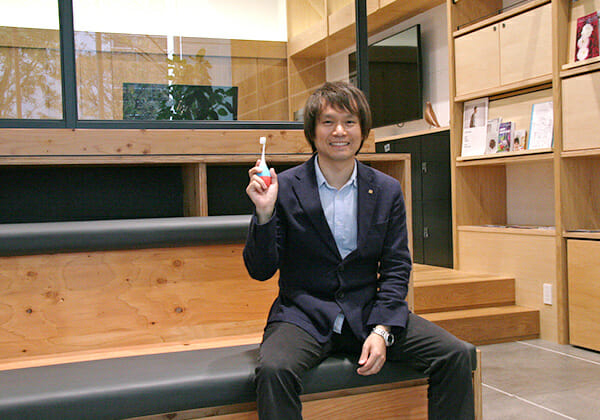
<After the interview
Posi was born as a result of the efforts of Kyocera, Lion, and Sony working together as one team. The various restrictions, the struggle against time, and the pains of creation were all factors that contributed to Mr. Inagaki's extraordinary love for the Posi. I tip my hat to Mr. Inagaki for his innovative idea of taking tooth brushing one step further from the perspective of health and regular lifestyle habits and making it a time for communication between parents and children. If this custom spreads, Mr. Inagaki's ultimate goal of "world peace through toothpaste" may be no more than a dream. Posi has been ranked by one magazine as one of the most anticipated hit products of 2020. We cannot take our eyes off of this promising trend.
Possi
https://first-flight.sony.com/pj/possi
https://www.kyocera.co.jp/news/2019/0701_bibi.html

